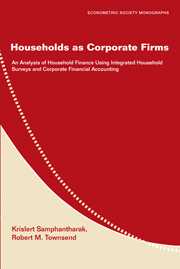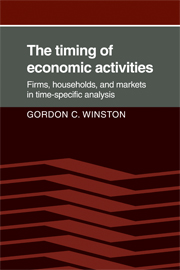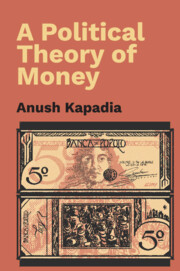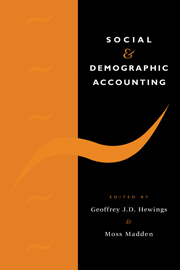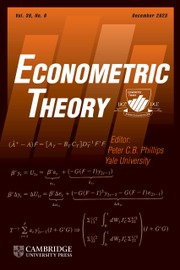Households as Corporate Firms
An Analysis of Household Finance Using Integrated Household Surveys and Corporate Financial Accounting
$100.00 (C)
Part of Econometric Society Monographs
- Authors:
- Krislert Samphantharak, University of California, San Diego
- Robert M. Townsend, Massachusetts Institute of Technology
- Date Published: December 2009
- availability: Available
- format: Hardback
- isbn: 9780521195829
$
100.00
(C)
Hardback
Other available formats:
Paperback, eBook
Looking for an examination copy?
If you are interested in the title for your course we can consider offering an examination copy. To register your interest please contact collegesales@cambridge.org providing details of the course you are teaching.
-
This investigation proposes a conceptual framework for measurement necessary for an analysis of household finance and economic development. The authors build on and, where appropriate, modify corporate financial accounts to create balance sheets, income statements, and statements of cash flows for households in developing countries, using an integrated household survey. The authors also illustrate how to apply the accounts to an analysis of household finance that includes productivity of household enterprises, capital structure, liquidity, financing, and portfolio management. The conceptualization of this analysis has important implications for measurement, questionnaire design, the modeling of household decisions, and the analysis of panel data.
Read more- First major household survey to treat the household as a corporate firm, not consumption/production unit
- Authors have been building their model for many years, testing it in field and classroom
- Long-awaited study in both development and financial economics
Reviews & endorsements
“This is path-breaking work. This monograph lays out the data needed for high-quality empirical work and gives concrete examples of how it can be done. This work and methodology should and will become extremely influential.” – Orazio Attanasio, University College London
See more reviews“The application of corporate accounting principles to household survey data is an important idea that not only imposes intellectual discipline on the study of household finance but also delivers new insights arising from the treatment of households as small businesses. In this monograph, Samphantharak and Townsend lay out the basic approach, tackle many detailed problems of implementation, and present intriguing empirical findings on rural Thai households’ productivity and financing constraints. The authors blaze a trail that many others will follow.” – John Y. Campbell, Harvard University
“For more than 10 years, Robert Townsend and his associates have collected unique data from Thai households. One of the features that makes this data particularly valuable is Townsend’s theory-driven data collection approach: no piece of information is collected without some clear understanding of what it means and why it is being collected. This book is an invaluable illustration of this approach: accounting theory is being marshaled to construct detailed financial statements for households, many of whom have a farm or a small business. Samphantharak and Townsend’s evident respect for these households should be a model and an inspiration for all future researchers.” – Esther Duflo, MIT
“The measurement of household assets and liabilities along with the decisions on how much to consume and invest is notoriously hard, especially in developing countries where households typically engage in a myriad of livelihood activities. Using the longest and richest high-frequency panel data ever collected in a developing country, this book combines rigorous analysis with practical advice. A must-read for anyone interested in development economics or involved in the design of household surveys.” – Xavier Giné, The World Bank
“Forty years ago, the microeconomics of the family opened a wide door for social scientists. Households as Corporate Firms gives that door a much-needed shove further open. The analytical structures described here will allow economists to collect better data, ask sharper questions, and bring into focus important parts of the economic lives of billions of people.” – Jonathan Morduch, New York University
“A wealth of new insights is brought to thinking about the financial health of individuals and households. Ideas from financial economics are integrated with the economics of household behavior to develop a powerful framework for better understanding household decision-making and financial well-being. The framework also points to important ways to improve measurement in household surveys. A must-read for anyone interested in development.” – Duncan Thomas, Duke University
Customer reviews
Not yet reviewed
Be the first to review
Review was not posted due to profanity
×Product details
- Date Published: December 2009
- format: Hardback
- isbn: 9780521195829
- length: 214 pages
- dimensions: 235 x 159 x 16 mm
- weight: 0.42kg
- contains: 2 b/w illus. 25 tables
- availability: Available
Table of Contents
Part I. Households as Corporate Firms:
1. Introduction
2. Conceptual framework
Part II. Household Financial Accounting:
3. Household surveys
4. Constructing household financial statements from a household survey
Part III. Household Finance:
5. Financial analysis
6. An application: liquidity constraints, kinship networks, and the financing of household investment
7. Discussion: measurement and modeling.Instructors have used or reviewed this title for the following courses
- Advanced Financial Economics
- Development Microeconomics
Sorry, this resource is locked
Please register or sign in to request access. If you are having problems accessing these resources please email lecturers@cambridge.org
Register Sign in» Proceed
You are now leaving the Cambridge University Press website. Your eBook purchase and download will be completed by our partner www.ebooks.com. Please see the permission section of the www.ebooks.com catalogue page for details of the print & copy limits on our eBooks.
Continue ×Are you sure you want to delete your account?
This cannot be undone.
Thank you for your feedback which will help us improve our service.
If you requested a response, we will make sure to get back to you shortly.
×
